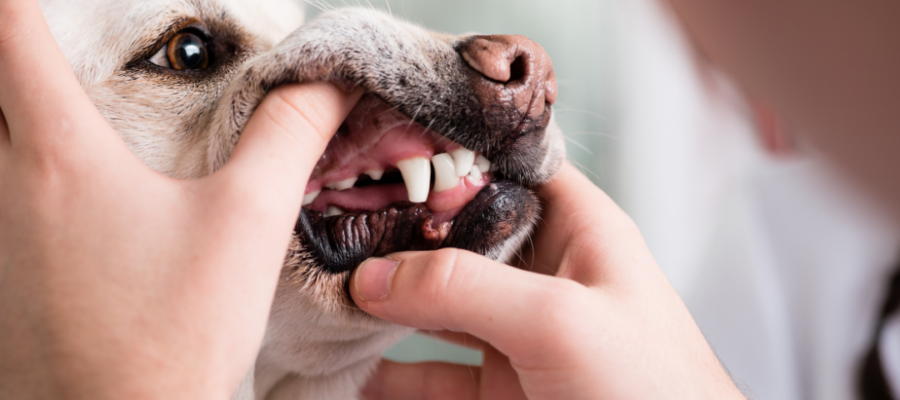How to Keep Good Dental Hygiene in Dogs

By Patricia Thomblison, DVM, MS
Have you ever dreaded being in the dentist’s chair and answering the questions regarding how often you brush, floss or use mouth wash? You know what the answers are, but can you honestly say them? You know what the best is, but some days do you only do what you can to get by? When at the veterinarian’s office, have you been asked about how often you care for your pets’ oral health and had to admit not often enough? Pets need dental care too.
POOR DENTAL HYGIENE LEADS TO DOG BREATH
The most obvious reason is to avoid dog breath that can knock you over, but there are other reasons as well. Dental disease can be very painful and keeping the teeth and gums healthy will help prevent oral pain. Tooth loss can occur when the structures that support teeth become damaged or infected.
Bacteria in the teeth can also enter the bloodstream and travel to the heart, kidney, and liver. This can cause organ damage and make pets very sick. According to an article published in Today’s Veterinary Practice, by the age of two, 80% of dogs and 70% of cats have some form of periodontal disease. The good news is periodontal disease is preventable with good veterinary care and regular home care.
DOG DENTAL CARE AT-HOME
You may know it’s best to brush your pets’ teeth every day, but you may find the whole prospect to be overwhelming and cumbersome? Here are some tips to help make caring for your dog or cat’s teeth and gums easier:
- Use a product that is recommended for animals. Some human toothpaste has ingredients that may harm your pet.
- If you are going to brush, use a brush designed for pets. Human toothbrushes can be too abrasive. Look for gentle bristles.
- Consider brushless products, such as Oratene® Brushless Enzymatic Oral Care, which are developed to be used without a brush. They contain a patented natural multi-complex enzyme system that keeps pet’s teeth and gums clean, fresh and supports normal periodontal health. The Brushless toothpaste gel is applied directly to the gum line with the tip of the tube, a finger, or a brush.
- Reward your pet every time you open your pet’s mouth to brush or apply the Oratene Brushless Toothpaste Gel. This will help your pet associate the oral care experience as one that is positive. Treats make a good reward but so do lots of hugs and affection.
WHAT ELSE YOU CAN DO FOR YOUR DOG’S DENTAL HEALTH
What can you do if you have a pet who doesn’t like its mouth opened or touched? Or what can you do if your lifestyle makes it challenging to care for your pet’s mouth daily? Oratene has two other products for daily prevention that don’t require brushing.
There is a drinking water additive and breath-freshening spray. Just like the Brushless Toothpaste Gel, they also freshen breath, prevent plaque build-up, and eliminate odor-causing germs. Both cats and dogs in your household can benefit from these and they are safe to be used by any age dog or cat.
Dental chews or treats can be considered as part of preventive dental health care. Check with your veterinarian about the appropriateness of particular chews and treats as some are marketed for dental health, but not all meet that criterion, and some may be choking hazards. Others may be so hard they crack or break the teeth. Always monitor your dog when they are chewing on anything and remember chews are a good add-on but not a substitute for daily care.
VETERINARY DENTAL CARE
And last, but certainly not least, it is important to have a professional evaluation and cleaning by your veterinarian. Your veterinarian will know what’s best and can locate, prevent, and treat any issues. This includes getting dental radiographs. Your dog will need to be sedated for part of the exam and treatment to get a true picture of your pet’s oral health. Some dogs and cats will need more professional care than others. Some may even need to be referred to a veterinarian with special training in pet dentistry.
Puppy kisses are the best, but with knowledge and care, your dog can give you sweet-smelling kisses at any age if you help take care of their dental health.


